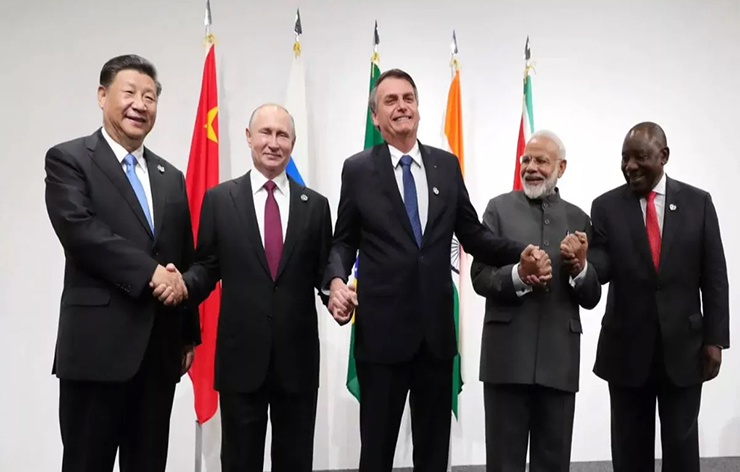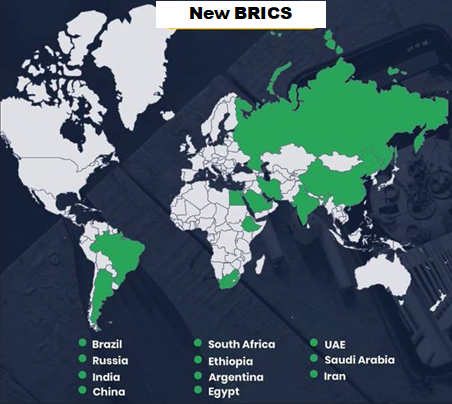
The 15th BRICS Summit in Johannesburg, South Africa, witnessed the second expansion of BRICS. In his address on August 24, 2023, South Africa’s President Cyril Ramaphosa, while announcing the summit’s outcome, said, “We have consensus on the first phase of the BRICS expansion process. We have decided to invite Argentina, Egypt, Ethiopia, Iran, Saudi Arabia and the United Arab Emirates to become full members of BRICS.” The bloc formed in 2009 by Brazil, Russia, India and China was first expanded in 2010 with the inclusion of South Africa.
The joint statement issued at the end of the summit stressed the importance of addressing the international debt agenda properly to support economic recovery and sustainable development while taking into account each nation’s laws and internal procedures. It noted the opportunities to build sustained momentum for change, with a continuing commitment to incorporate the voice of the Global South during the presidencies of G20 by India in 2023, Brazil in 2024, and South Africa in 2025. Other high points of the joint statement included:
- Reaffirmed the importance of G20 being a premium multilateral forum in international economic and financial cooperation to jointly address global challenges.
- Support the inclusion of the African Union as a G20 member at the New Delhi G20 Summit.
- Cooperation of BRICS members to manage risks and challenges in achieving global economy and sustainable development.
- Recognition of high debt levels in some countries reducing the fiscal space to address development challenges – monetary tightening in advanced economies, rising interest rates and tighter financial conditions.
- Need for early and coordinated implementation of the G20 Common Framework for Debt Treatment in conjunction with official and private creditors and Multilateral Development Banks.
- Implementing Strategy for BRICS Economic Partnership 2025, and identifying solutions to speedy implementation of the 2030 Agenda for Sustainable Development.
An important geo-economic development of strategic dimensions was the BRICS nations collectively endorsing the use of local currencies as a means to strengthen economic ties and facilitate seamless transactions between member nations and their trade partners; aimed at creating an environment that supports international trade and financial interactions, ultimately contributing to robust economic growth.
President Ramaphosa mentioned the success of the Chandrayaan 3 mission to the moon while inviting Prime Minister Narendra Modi to deliver a speech. Modi, in his speech, backed the BRICS expansion while advocating for a multi-polar world order. He also spoke at length about India’s achievements in space research.
According to the International Monetary Fund (IMF), the original BRICS will collectively account for 32.1 percent of the global GDP by the end of 2023; this will be up from just 16.9 percent in 1995 and more than the G7 share of 29.9 percent. The current BRICS five members presently contribute 31.5 percent of the global GDP, while the G7 share has fallen to 30 percent. However, with the inclusion of Argentina, Egypt, Ethiopia, Iran, Saudi Arabia and the UAE, BRICS is expected to contribute 50 percent of the global GDP by 2030. This could go up more in the future as and when more members join BRICS.
The significance of the current expansion is the oil-producing nations, and consequently the setback in petrodollars. The US-led West is to blame itself for economic terrorism through arbitrary economic and other sanctions, freezing funds in central banks of nations at will and denying the SWIFT system, the repercussions of which still don’t seem to have sunk in yet despite European economies adversely affected because of America’s war on Russia using Ukraine as the proxy.
There were doubts in many quarters whether BRICS would be able to expand. But the second expansion has already happened. Critics, including in India, are now talking of unachievable cohesion within BRICS, especially because of the India-China continuing standoff. But the 15th BRICS Summit also was held in the backdrop of the India-China standoff. Doesn’t the joint statement show cohesive progress? One may say that consensus for a common BRICS currency has not emerged. However, evolving a common currency, and more so, setting up the transaction system for it will take a long time, which may even become tougher with more members joining.
But the decision to use local currencies for seamless transactions between members and their “trade partners” is progress enough. India is already transacting in local currency with the UAE and can now do so similarly with Brazil, Russia, South Africa, Iran, Ethiopia, Egypt, Saudi Arabia and Argentina. However, India is paying Russia in the Chinese Yuan for importing crude oil and this may continue for a long time till the INR becomes strong enough as an international currency.

Now Brazil has proposed the Chinese Yuan as a Trade Guarantee to Argentina – Brazil’s exports to Argentina will be in Yuan. This has shocked the West, as is apparent from the pig-headed outburst from Günther Fehlinger, President of the NATO European Development Committee, for Brazil having participated in the BRICS Summit and refusing to supply weapons to Ukraine. Fehlinger threatened that NATO would dismantle Brazil, dividing it into five states, if Lula da Silva continued as the President of Brazil. Possibly, neo-Nazi Fehlinger considers himself to be Hitler’s direct descendent.
The West has also been criticising the Central Asian Republics for fear of them joining the SCO and BRICS. This is despite their economic links with these countries. For example, Kazakhstan has already pumped some 90,000 tons of oil to Germany, according to the Kazakh energy minister. Kazakhstan mostly gets its imported products from Russia and uses its terminals for exports. Germany is now looking to secure deals for Kazakh energy via Azerbaijan, Georgia and Turkey. Germany has also been using the Druzhba pipeline. The loser is Europe for sanctioning Russia and then getting Russian oil through a third country by paying more.
Finally, the expansion of BRICS is a good development for the multi-polar world order. Its stature to counterbalance the West at the economic level is growing. Western confrontation with Russia and China will give it more impetus. Also, Russian President Vladimir Putin has announced the BRICS Games 2024 (June 12-24) and invited all members of the expanded BRICS to the event, saying, “Russia will be happy to welcome BRICS athletes during the 2024 Games of the Future, which will feature hybrid disciplines in both traditional sports and popular games.” As BRICS expands, these games will be an apt rejoinder to the West for weaponising sports.
-The writer is an Indian Army veteran. Views expressed are personal.








